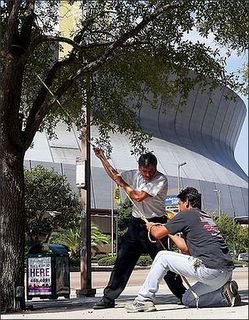i attended an Alcoholics Anonymous meeting last thursday to fulfill a requirement for my Addiction & Grace class. i was looking forward to the opportunity to witness first-hand an AA meeting. one of the points of contact set up a pre-meeting with some of the organizers and participants. here are some descriptions of what i experienced...
march 3rd - 7 pm (pre-meeting), 8 pm (meeting)
i attended the meeting with four other students from pts. Ben met us at the door and led us into the methodist church where the meeting was held. we spent approximately an hour with Ben and another organizer named Doug.
Ben has been with AA for 27 years and Doug has been with AA for 6 years. Ben is Doug's sponsor. we asked them spontaneous questions. we asked about the religious nature of the 12 steps. Ben responded that the 12 steps focus on the role of spirituality but without any specific religion. his quote was "religion is for figuring out who goes to hell, spirituality is for people who have already been there." Ben and Doug shared that many AA participants do not want to hear about God when they first come through the door because their thought process is "if God was real, then He wouldn't have allowed me to get into this mess or God would have rescued me when I called out to him." the reference to a higher power is not as offensive because they realize that they need help from something beyond themselves.
Ben proceeded to let us know that the black church was one of the last groups to find value in AA because they believed that they could preach people away from alcohol. Ben shared that it was a lack of education that kept the black church from referring people to AA. he shared that there are numerous black churches that now see the value of AA in the recovery process.
Doug then shared about the role of a sponsor. Ben was Doug's sponsor. Ben has a sponsor who has been with AA for over 40 years. Doug is also sponsoring someone who has been with AA for 1 1/2 years. Doug shared that a person starts with AA by attending 90 meetings in 90 days. the sponsor connects with the person and helps them through that time period and beyond as they work on the 12 steps. Doug shared that being a sponsor is also a way to help the one sponsoring because he or she is helping another person. (note: the 12th step includes sharing the experience of AA with others and helping).
the last thing i remember from the pre-meeting is that most, if not all, individuals who show up at AA meetings are not there by their own decision. on the other hand, most are there because they have been ordered by a court or another authority. Ben shared that an alcoholic's ego is so full that he or she would never decide to get help. he said that mostly this was because the self-denial is so high with alcoholism. usually someone else notices the problem and reports the problem.
i wanted to ask Ben about how these individuals are integrated into the AA community if they arrive with such high levels of self-denial and a large ego. we ran out of time in the pre-meeting however.
---
the meeting itself included approximately 30 persons. there was a group from another location. the meeting was called a 'home group' and the other group was another 'home group' who was visiting. the meeting started with announcements of events and welcoming of new members. as expected, each person said "my name is ______, and i am an alcoholic". the group responded with "hi ________". if the person was new they would add "welcome!" there was definitely a sense of openness and shared experiences right from the beginning.
the meeting transitioned from announcements to sharing by the guest group. one person from the guest group stood up and introduced the guest group. he included some words about his experiences but he served more as a moderator. three women shared. i will note some of the ideas or experiences that jumped out to me...
the first woman shared how her love for alcohol started with a family wedding where she ate cake with alcohol on it and then did an elvis impersonation in front of everyone. they all laughed and she realized that she could be entertaining as a result of alcohol. that continued all the way through high school and college. eventually, alcohol became an addiction and she found ways to hide it. eventually, alcohol led to her losing her nursing license and she realized the problem was deeper than she could control. she joined AA and now she finally worked back to getting her license and she is clean. she realizes that one drink will destroy her entire life. she now is engaged and is living again.
the second woman focused a lot on the spiritual aspect of AA and how she refound her faith as a result of AA. she shared that she now wakes up, asks God for help, works hard at the 12 steps all day, and then by God's grace gets through the day without taking a drink. she said that she realizes now how empty she was without her faith.
the third woman shared about how she grew up in a house where the smell of alcohol was as prevalent as the smell of bread in some houses after a person baked bread. she always remembered smelling alcohol. she said that her dad let her drink from a can of beer when she sat on his lap and he played guitar. she shared that she dragged her family from minnesota to new jersey and that her addiction to alcohol increased and increased. she eventually joined AA and she said that she knows that if she takes another drink then she will end up dead. in her words "if i take another drink, then i will end up dead because my body has gone through way too much to handle another run".
overall, there was a consistent sense that taking one drink will destroy the life of the recovering alcoholic. each of the women realized the stakes of the decision. in addition, they saw how the community of AA was integral in them keeping clean of alcohol. the 12 steps, the sharing of stories, the ways to help (sponsor, set up, clean up, etc) all contribute to their staying away from alcohol.
in many ways, there was elements of a 'true' church in the AA meeting.
openness with regards to real problems
community that holds up individuals so they do not fall back into alcohol
sharing of stories of past horrors and recent successes
sharing of 'conversion' stories
sponsor - similar to discipling relationship, generations of sponsors
visiting other 'home groups'
multiple types of meetings - open sharing, learning from books/application of 12 steps
coffee :)
Ben said that the only requirements for starting an AA meeting are a location and a coffee pot...
i was emotionally moved by the experience and i saw how a person who understands the extent of their helplessness is available to help from beyond themselves.
i couldn't help but think that the middle-upper class individual who has enough distractions to medicate his or her life doesn't see the need for any help from God - especially Jesus Christ...























